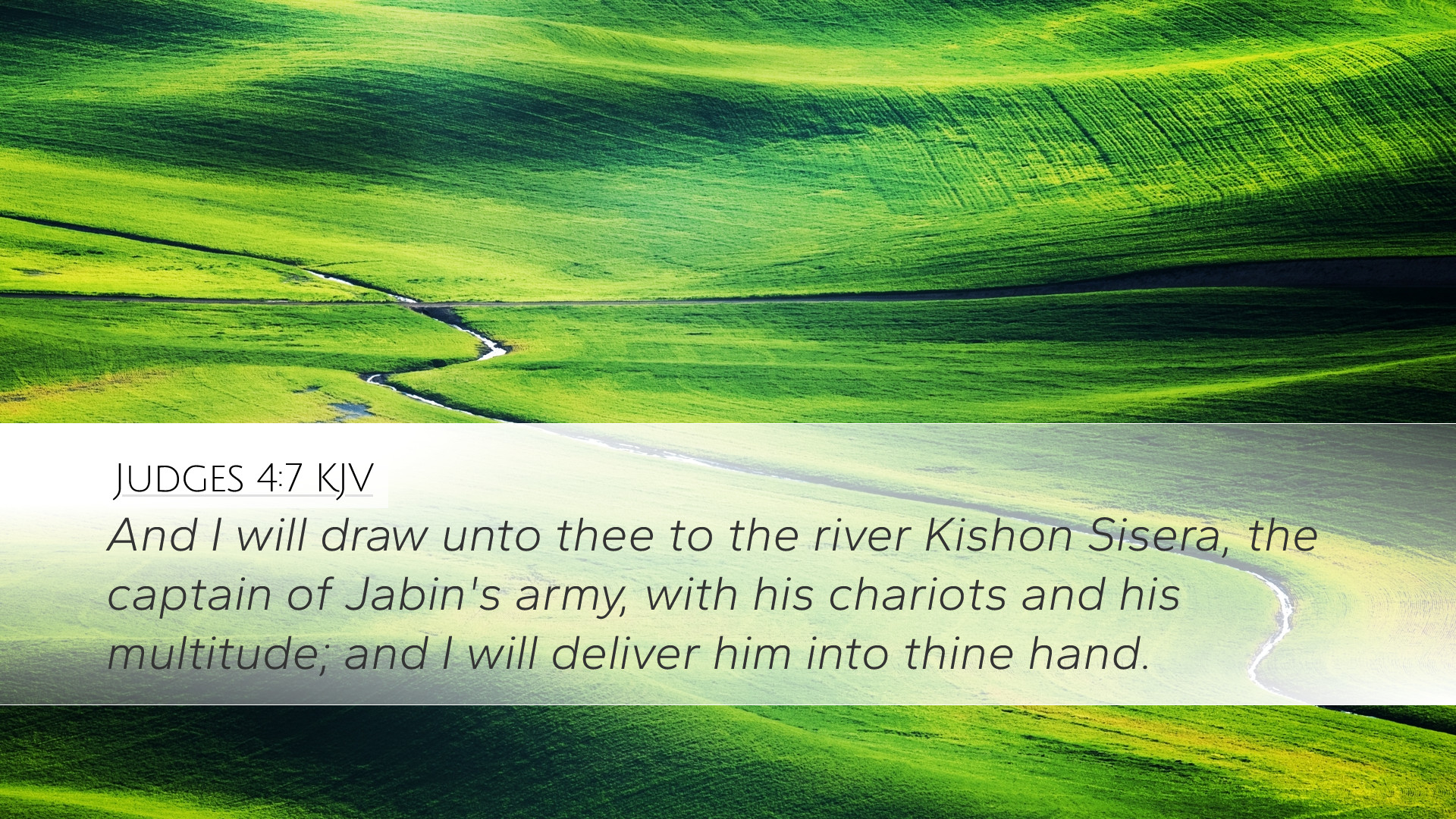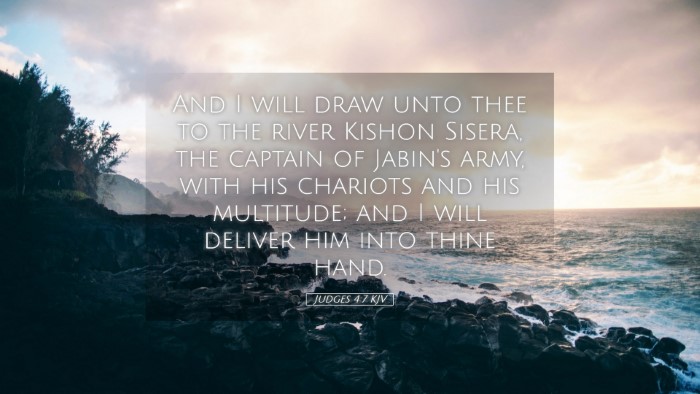Old Testament
Genesis Exodus Leviticus Numbers Deuteronomy Joshua Judges Ruth 1 Samuel 2 Samuel 1 Kings 2 Kings 1 Chronicles 2 Chronicles Ezra Nehemiah Esther Job Psalms Proverbs Ecclesiastes Song of Solomon Isaiah Jeremiah Lamentations Ezekiel Daniel Hosea Joel Amos Obadiah Jonah Micah Nahum Habakkuk Zephaniah Haggai Zechariah MalachiJudges 4:7
Judges 4:7 KJV
And I will draw unto thee to the river Kishon Sisera, the captain of Jabin's army, with his chariots and his multitude; and I will deliver him into thine hand.
Judges 4:7 Bible Commentary
Commentary on Judges 4:7
Judges 4:7 states:
"And I will draw unto thee to the river Kishon Sisera, the captain of Jabin's army, with his chariots and his multitude; and I will deliver him into thy hand."
Introduction
The verse captures a pivotal moment in Israel's history when God, through Deborah the prophetess, commands Barak to engage Sisera, the commander of Jabin's army. This passage not only reflects God's sovereignty and deliverance but also demonstrates the dynamic role of faith in human obedience.
Interpretation and Insights
-
Divine Strategy and Sovereignty
Matthew Henry emphasizes the strategic nature of God's command. The location by the river Kishon is significant, as it is a clear choice for drawing Sisera and his formidable military might into a specific location where God would intervene. This showcases God's sovereignty over the circumstances, illustrating that no army is too great to be overthrown by divine intervention.
-
Call to Leadership
Albert Barnes points out that God's call to Barak highlights the importance of leadership in Israel's history. Barak was summoned not only to lead men into battle but to act according to God's command, underscoring that true leadership is rooted in obedience to God. This poses a reflective question for today’s leaders about the source of their authority and direction.
-
The Nature of Faith
Adam Clarke discusses Barak's initial hesitance when called to battle. His request for Deborah to accompany him speaks to the human condition of doubt and reliance on visible encouragement. This interaction reveals a profound truth regarding faith: often, God calls individuals to take risks that may seem daunting, and our hesitations are met with divine promises that reassure and empower us.
-
The Chariots and Multitude
The mention of Sisera’s chariots and multitude is critical as it symbolizes oppression and formidable strength. Those studying this passage must reflect on the implications of facing overwhelming odds. Matthew Henry notes that Israel facing Sisera represents not just a physical battle but a spiritual one, where faith combats fear. It is within this frame that God equips His people to face giants.
-
The Assurance of Victory
The proclamation of deliverance by God indicates the assurance provided to those who obey Him. Albert Barnes explains that God's declaration, "I will deliver him into thy hand," signifies a promise that elevates the mission and emboldens Barak. This reflects God's faithfulness as a covenant-keeping God who delivers on His promises despite the magnitude of the challenge.
Theological Implications
This verse raises profound theological themes, such as:
- God’s providence and planning: God's orchestration of events reinforces His sovereign rule over history.
- The empowerment of God's people: Barak’s obedience is rewarded with divine assistance, illustrating the principle that faith invokes God's power.
- The interplay of divine will and human action: The narrative displays how God uses willing human vessels to accomplish His purpose, supporting the idea that active faith is crucial in the life of believers.
Practical Applications
For contemporary readers, this passage offers various practical applications:
- Obedience to God’s call: Just as God called Barak, He calls believers today to act in faith and service, even when the challenges seem insurmountable.
- Facing fear with faith: The story serves as a reminder that God equips His followers with the strength to face fears, empowering them to confront their own Sisera-like challenges.
- Trusting divine assistance: In moments of difficulty, believers should remember that God promises to be their ally in trials and tribulations. The assurance of victory should encourage them to step out boldly in their faith.
Conclusion
Judges 4:7 encapsulates the essence of faith-driven action in times of adversity. By studying this verse, theologians, pastors, and those seeking deeper insight into Scripture can appreciate the multifaceted nature of God’s call and the necessity of human cooperation with divine will. The rich commentary from figures like Matthew Henry, Albert Barnes, and Adam Clarke encourages a thorough exploration of God's promises, challenges, and the assurance of victory in the journey of faith.


